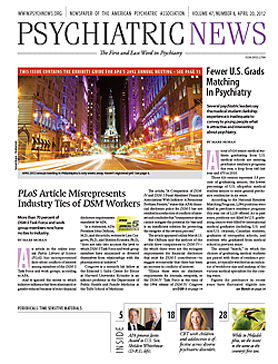Young people with early-onset schizophrenia demonstrated minimal neurocognitive improvements associated with antipsychotic treatment, and the small improvements that were demonstrated were consistent with practice effects as described in adults with chronic schizophrenia treated with first-generation antipsychotics and second-generation antipsychotics.
That was the finding from the Treatment of Early-Onset Schizophrenia Spectrum Disorders (TEOSS), funded by the National Institute of Mental Health. The study was published in the Journal of the American Academy of Child and Adolescent Psychiatry and posted on March 15.
The TEOSS study itself did not include a control group and as a result could not provide an estimation of “practice” effects—the effects of subjects gaining proficiency on neuropsychological test performance because of practice— between time points. For that reason, even such small improvements as were seen in early-onset patients treated with atypicals cannot be reliably related to the drug treatment itself.
Early intervention in psychosis is widely recognized as crucial to long-term outcome, and many researchers have come to regard cognitive deficits as a critical—even defining—feature of psychosis. So while the CATIE study and others have shown little benefit for cognition from atypical antipsychotics, the TEOSS study was designed to test whether such benefits might accrue if treatment was begun early, before patients have experienced years of psychosis.
But the results extend to early-onset patients the same disappointing results found for adults in the CATIE trials and elsewhere, refuting industry claims that atypical antipsychotics produce enduring improvements in cognition for patients with schizophrenia.
“The magnitude of change in neuropsychological test performance observed in TEOSS is quite modest and very much within the range of effect sizes attributable to practice effects, which are often larger,” lead author Jean Frazier, M.D., told Psychiatric News. “This is why it remains important for child and adolescent psychiatrists to monitor cognitive problems associated with the illness carefully, and support or facilitate alternative or augmentative strategies for cognitive compensations, such as environmental supports, development of compensatory strategies, and cognitive remediation.”
Neurocognitive functioning of youth (aged 8 to 19 years) with schizophrenia or schizoaffective disorder was evaluated in a four-site, randomized, double-blind clinical trial comparing molindone, olanzapine, and risperidone. The primary outcomes were overall group change from baseline in neurocognitive composite and six domain scores after eight weeks and continued treatment up to 52 weeks.
No significant differences emerged in the neurocognitive outcomes of the three medication groups. When the three treatment groups were combined into one group to assess overall outcomes, modest but statistically significant improvements were observed in the composite score. Small but significant improvements were seen in three of six domain scores—fine motor, inhibitory control, and social cognition—during the acute phase from baseline to eight weeks, and in four of six domain scores (fine motor, inhibitory control, attention, and cognitive efficiency) between baseline and week 52.
However, the minimal benefits found are consistent with practice effect improvements seen in adult studies.
William Carpenter, M.D., director of the Maryland Psychiatric Research Center and chair of the DSM-5 Psychotic Disorders Work Group, said the results should come as no surprise. “It is already established that first- and second-generation antipsychotic drugs are similar in their lack of efficacy for impaired cognition,” he told Psychiatric News. “This study extends this observation to young people early in psychosis. Early intervention for cognition may be essential for any life-changing effect, but testing this hypothesis requires a treatment with efficacy for cognition. Antipsychotic drugs are not viable candidates in this regard.”
Frazier concurred. “While antipsychotic treatment of youth with early-onset schizophrenia may make a small contribution to improvements in cognition, the cognitive deficits associated with the illness are not well treated by any current medication,” she said. “Psychiatrists need to remain sensitive to the cognitive deficits their school-aged patients with early-onset schizophrenia show and keep in mind that these deficits are typically durable across illness phases and have an important impact on daily and school functioning. Child psychiatrists should include in their treatment plans alternative pharmacological and psychosocial interventions to support or remediate cognitive deficits.”

An abstract of “Neurocognitive Outcomes in the Treatment of Early-Onset Schizophrenia Spectrum Disorders Study” is posted at www.jaacap.com. 